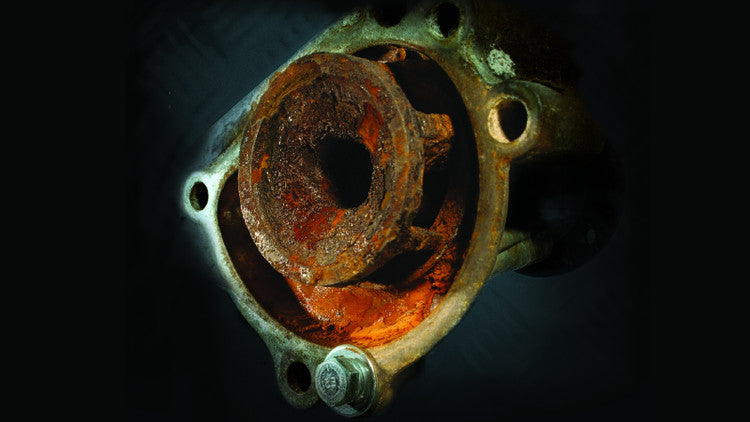
Water in racing radiators, can it damage the aluminum and create leaks?
Share
What Type of Water Should I Use in My Aluminum Racing Radiator?
Is Distilled Water the Best for Racing Radiators?
What about “water wetters”?
By Jean Genibrel
Copper radiators were the norm years ago before aluminum became more affordable and welding, and brazing aluminum techniques grew more mainstream. Aluminum radiators have become ubiquitous in racing due to their affordability, light weight, and availability. However, the use of aluminum has opened some debates whose answers have remained unclear, to completely unsolved. The major question that still gnaws at every racer is: “What type of water should I use in my racing aluminum radiator?”
It is possible that using the wrong type of water without the proper additive can facilitate electrolysis where the ion depletion of the aluminum can create holes and leaks. While in some instances there is some truth to this claim, the reality is that using perfectly pure water (distilled, etc.) at the temperatures race car cooling systems operate would cause minute, if any, damage. Pure water (from distillation, deionization or by reverse osmosis) is free of solutes and salts. These solutes balance the PH in the water, and they offer a buffer to prevent the water from craving ions from the aluminum. However, these solutes can create deposits and enhance corrosion.
TYPES OF WATER:

Some racers have the luxury to carry spare radiators and water. The cooling system in rally and off road racing must be as reliable as those in a stock car or Sprint Car. There, the judicious choice of the type of water and its additives is paramount as it is in all forms of racing.
Tap water is the most readily available. The problem with tap water is that it is always unknown what types of minerals and in what quantities it contains. Water from wells falls in the tap water category. Tap water can be utilized in race radiators if they have the proper additive installed.
Soap from car washes is the primary culprit for external radiator corrosion. Corrosion will eventually puncture the radiator, and the buildup on the outside reduces air flow.
Water, when heated, drives off a significant proportion of dissolved oxygen, but it reabsorbs fresh oxygen as it cools. This cycle leads to a perpetual cycle of corrosion, which is accentuated in cooling systems with no expansion tank.
Water also acts as an electrolyte if dissolved solids, such as hardness salts (lime scale), are present. These products promote galvanic corrosion where metals of high nobility sacrifice themselves to metals of lower nobility – this problem often manifests itself by pitting. To avoid electrolysis the radiator must be isolated from the rest of the vehicle and the electrical components, like electric fans and even rotating components like transmissions, should be grounded to the frame, not the radiator.
Filtered and reverse osmosis waters are filtered by some means to remove the larger impurities but not all the minerals. This process is similar to filtering coffee through a paper filter.
Distilled water is the purest form of water available. Distilled water is fully devoid of any minerals and other impurities. Distilled water is produced by boiling water and recapturing the steam. When the steam is cooled it returns to water in its purest form. Rainwater is another form of distilled water.
CHOICES AND OPTIONS:
Many factors influence the selection of water that we can use in a race aluminum radiator. Chief among them is the type of additive that will, or not, be used in the water. Antifreeze is an additive. Using tap water may be OK in some parts of the country but in others the water may contain high levels of minerals that, in time, may cause deposits in the cooling system. Distilled water will attract aluminum ions to balance its PH level creating aluminum depletion that would be temporary and minimal. The type of aluminum the manufacturer has used can also be a factor. The radiator core tubes are typically the thinnest material in the circuit at approximately .013" thick, so it does not take long for the radiator to develop leaks if the wrong type of water or additive is used or if the radiator is not “cured” properly for passivation. Checking with the radiator maker is always the best approach to choosing the best type of water and additive for your radiator. The following information from the Aluminum Association may help clarify the subject.

The water in a radiator attacks steel, copper and aluminum. Using distilled water and antifreeze is always the best approach to preventing corrosion. Tap water can be used if it is combined with the proper amount of antifreeze, and, or, the correct water wetter. The type of water used is immaterial as long as it is coupled with the right additive.
SO WHAT KIND OF WATER SHOULD I USE IN MY RACING ALUMINUM RADIATOR?
Or should the question be? “What type of additive should I use in my water?” It does not matter what type of water you use as long as you use the right additive for the type of water used. And antifreeze is an additive. So ask the additive and the radiator manufacturer for their recommendation. Generally, distilled water will be a good choice for used aluminum radiators.

